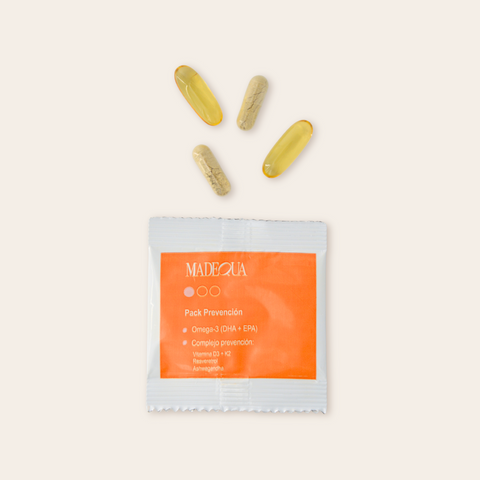Menopause is a natural phase in a woman's life that occurs gradually, often beginning in the premenopause stage , when hormone levels begin to fluctuate.
Estrogen levels begin to gradually decline. This transition can bring with it some symptoms that, although normal, can affect quality of life if not managed properly.
In this article, we explore the early symptoms of menopause, how to spot early symptoms, and what the early symptoms of menopause are and how to relieve them.
Premenopause and the role of estrogens
Premenopause is the phase that precedes menopause itself and can begin years before menstrual periods definitively end. It lasts approximately between the ages of 40 and 45 , and menstruation is still regular .
During this stage, estrogen levels, a crucial hormone for women's health, begin to decline and fluctuate as ovarian activity slows, triggering the first symptoms of menopause.
Estrogens play essential roles in the body, regulating the reproductive system, supporting mood, and contributing to bone and cardiovascular health. As estrogen levels decline, hormonal changes can affect both the body and mind, causing symptoms such as fatigue , stress , anxiety , and sagging skin .
How to detect the first symptoms of menopause?
Detecting the early symptoms of menopause can be like playing a game of treasure hunt with your own body. Suddenly, it starts sending you mysterious signals that, if you're not prepared, can seem like a mystery.
When menopause begins to appear, some of the most subtle and less-discussed signs are reflected in the skin and mood. For example, dry skin may be one of the first symptoms to appear.
Suddenly, your once soft and supple skin may start to feel tighter or rougher, as if it's forgotten how to retain moisture. This is due to declining estrogen levels, which play a crucial role in keeping skin hydrated and elastic.
Sagging skin can also join the party, as hormonal changes affect collagen production, which can cause certain areas of the body to lose firmness. So, if you suddenly notice that gravity seems more insistent than before, it's completely normal at this stage.
On an emotional level, stress and anxiety can intensify without warning. The hormonal decline can make you feel more restless or as if your patience has taken a vacation. You may even find yourself worrying about things that didn't even affect you before, which can be disconcerting.
If you start to notice that these symptoms are interfering with your well-being, there are many ways to take care of yourself: from an extra moisturizing routine for your skin or taking natural supplements for extra support, to relaxation techniques like yoga or meditation to keep stress at bay.
Listen to your body and give it what it needs!
What are the first symptoms of menopause and how can they be relieved?
Understanding and recognizing the early symptoms of menopause is essential to anticipating its effects and taking steps to promote health and well-being, helping you navigate menopause in an optimal state of health. Some of the early symptoms include:
1. Sagging and changes in the skin
With the decrease in estrogen, collagen and elastin production decreases, affecting skin firmness, especially in areas like the face, neck, and arms. This change manifests as sagging and, in some cases, drier skin. Although these changes are normal, they can be uncomfortable for many women.
How to relieve them?
To counteract sagging skin, it's essential to maintain proper hydration and adopt a diet rich in antioxidants, including resveratrol . Resveratrol is found in various plants, such as grapes and blackberries, and has been studied for its many health-promoting properties. It has been highlighted as a potent antioxidant with broad anti-inflammatory properties. This compound has proven to be a powerful supplement for women preparing for menopause . It acts on the skin in a multifactorial way . On the one hand, it reduces inflammation and edema (swelling caused by fluid accumulation), while also increasing collagen levels, leading to greater elasticity and reduced sagging. On the other hand, it promotes skin cell renewal.
Omega-3 supplementation (found in fish, nuts, and seeds) has also been shown to increase skin moisture, smooth skin, and reduce wrinkles.
With Madequa's Prevention-Premenopause Pack , you can reap all the benefits mentioned above, as it contains both Omega-3 and Resveratrol. It reduces the signs of aging and prepares your body for menopause. Formulated by gynecologists and pharmacists with natural, hormone-free ingredients, it helps reduce the signs of aging and prepares your body for menopause.
2. Stress and anxiety
The drop in estrogen levels also affects the central nervous system, affecting emotional balance. Women may experience mood swings, anxiety, or increased irritability due to these hormonal fluctuations. These symptoms are often more noticeable during premenopause and can impact overall well-being if not managed properly.
How to relieve them?
In addition to relaxation techniques such as meditation and yoga, taking natural supplements like Madequa , which offer specific support for premenopause, helps regulate emotional well-being with high-quality, scientifically validated ingredients. Standing out among the components of the Prevention-Premenopause Pack is Ashwagandha , considered an adaptogen (herbs, roots, or other plant parts that, when consumed, are believed to neutralize the effects of stress on the body and return it to a state of balance). Clinical studies have shown that supplementation with Ashwagandha root extract reduces stress, anxiety, and depression by lowering cortisol (stress hormone) levels.
3. Fatigue and decreased energy
Fatigue is another of the early symptoms of menopause that can occur in premenopause. The decline in estrogen levels affects sleep quality, which can lead to persistent tiredness and affect daily energy.
How to relieve them?
Improving sleep quality can be key to reducing fatigue. The Spanish Association for the Study of Menopause (AEEM) has developed a guide to natural products for sleep management , including Ashwagandha . Here are some tips:
- Keep a fixed schedule : Go to bed and wake up at the same time every day.
- Create a relaxing ritual : Read, meditate, or take a bath to signal to your body that it's time to sleep.
- Prepare your room : Keep it dark, cool and quiet.
- Avoid screens before bed : Step away from devices 30 minutes before bedtime.
- Be careful what you consume : Limit caffeine and alcohol, and avoid heavy meals close to bedtime.
- Exercise regularly : But not just before going to bed.
- Try relaxation techniques : Use deep breathing or a body scan if you're having trouble sleeping. A body scan is a relaxation technique to help you sleep. Lie down comfortably, close your eyes, and breathe deeply. Then, mentally scan your body from head to toe, relaxing each part and releasing tension. If you get distracted, return your focus to the feeling of relaxation. It's a simple way to calm your mind and prepare your body for rest!
- Manage stress : Write down your worries to free your mind before going to bed, and you'll deal with them the next day.
The importance of prevention in women's health
Recognizing the early symptoms of menopause and adopting preventive measures is essential for maintaining health during and beyond the premenopause period. Preventive care also helps manage symptoms more effectively and improves quality of life. Medical support and quality natural supplements specifically for this stage, such as Madequa's Premenopause Prevention Pack, are important tools to ease this transition and take care of your well-being holistically.
References
Navarro MC, Losa F, Alonso MJ, Bachiller I, Beltrán E, Estivill C, Herrera A, Ortega T, Prado A, Mendoza N, Natural products for sleep management, AEEM MenoGuide. First edition 2024.
Sparkes C, Gibson R, Sinclair A, Else PL, Meyer BJ. Effect of Low Dose Docosahexaenoic Acid-Rich Fish Oil on Plasma Lipids and Lipoproteins in Pre-Menopausal Women: A Dose⁻Response Randomized Placebo-Controlled Trial. Nutrients. 2018; 10(10):1460. doi:10.3390/nu10101460.
Bernasconi AA, Wiest MM, Lavie CJ, Milani RV, Laukkanen JA. Effect of Omega-3 Dosage on Cardiovascular Outcomes: An Updated Meta-Analysis and Meta-Regression of Interventional Trials. Mayo Clin Proceedings. 2021;96(2):304-313. doi: 10.1016/j.mayocp.2020.08.034.
Wei BZ, Li L, Dong CW, Tan CC; Alzheimer's Disease Neuroimaging Initiative; Xu W. The Relationship of Omega-3 Fatty Acids with Dementia and Cognitive Decline: Evidence from Prospective Cohort Studies of Supplementation, Dietary Intake, and Blood Markers. Am J Clin Nutr. 2023;117(6):1096-1109. doi: 10.1016/j.ajcnut.2023.04.001.
Córdova Aguilar JN. Effect of omega-3 supplementation on facial skin of patients in a medical center in the Miraflores district in 2013. Lima: Sacred Heart Women's University; 2014.
Sanchez A, Puche R, Zeni S. The role of calcium and vitamin D in bone health, part I. REEMO. 2002.
Anagnostis P, Livadas S, Goulis DG, Bretz S, Ceausu I, Durmusoglu F, Erkkola R, Fistonic I, Gambacciani M, Geukes M, Hamoda H, Hartley C, Hirschberg AL, Meczekalski B, Mendoza N, Mueck A, Smetnik A, Stute P, van Trotsenburg M, Rees M, Lambrinoudaki I. EMAS position statement: Vitamin D and menopause health. Maturitas. 2023 Mar;169:2-9. doi: 10.1016/j.maturitas.2022.12.006.
Capozzi A, Scambia G, Migliaccio S, Lello S. Role of vitamin K 2 in bone metabolism: a point of view and a short reappraisal of the literature. Gynecol Endocrinol. 2020; 36(4):285-288. doi: 10.1080/09513590.2019.1689554.
Beulens JW, Booth SL, van den Heuvel EG, Stoecklin E, Baka A, Vermeer C. The role of menaquinones (vitamin K₂) in human health. Br J Nutr. 2013; 110(8):1357-68. doi: 10.1017/S0007114513001013.
Meng T, Xiao D, Muhammed A, Deng J, Chen L, He J. Anti-Inflammatory Action and Mechanisms of Resveratrol. Molecules. 2021; 26(1):229. doi: 10.3390/molecules26010229.
Leis K, Pisanko K, Jundziłł A, Mazur E, Mêcińska-Jundziłł K, Witmanowski H. Resveratrol as a factor preventing skin aging and affecting its regeneration. Postepy Dermatol Allergol. 2022; 39(3):439-445. doi:10.5114/ada.2022.117547
Mikulska P, Malinowska M, Ignacyk M, Szustowski P, Nowak J, Pesta K, Szeląg M, Szklanny D, Judasz E, Kaczmarek G, Ejiohuo OP, Paczkowska-Walendowska M, Gościniak A, Cielecka-Piontek J. Ashwagandha (Withania somnifera)-Current Research on the Health-Promoting Activities: A Narrative Review. Pharmaceutics. 2023; 15(4):1057. doi: 10.3390/pharmaceutics15041057.
Akhgarjand C, Asoudeh F, Bagheri A, Kalantar Z, Vahabi Z, Shab-Bidar S, Rezvani H, Djafarian K. Does Ashwagandha supplementation have a beneficial effect on the management of anxiety and stress? A systematic review and meta-analysis of randomized controlled trials. Phytother Res. 2022; 36(11):4115-4124. doi: 10.1002/ptr.7598.
Cheah KL, Norhayati MN, Husniati Yaacob L, Abdul Rahman R. Effect of Ashwagandha (Withania somnifera) extract on sleep: A systematic review and meta-analysis. PLoS One. 2021; 16(9):e0257843. doi: 10.1371/journal.pone.0257843.




Comments (0)
There are no comments for this article. Be the first one to leave a message!